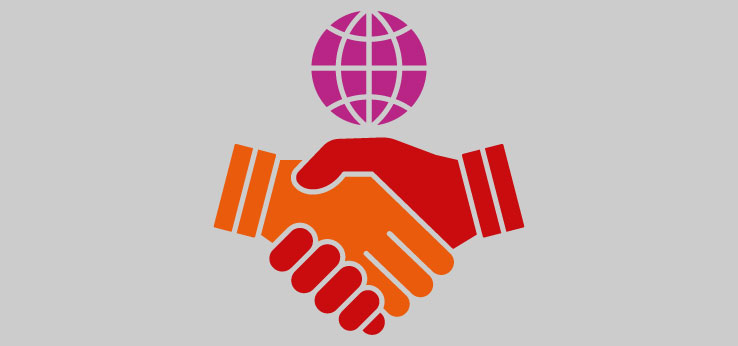Partnership Agreements
The Department of International Affairs provides sample contracts as well as information on processes and guidelines for establishing new partnerships with international universities. These documents can be used for initiating new partnerships, setting up partnership agreements and establishing double degree programs.
Jump to
This page is intended for members of TH Köln who would like to establish or expand international partnerships. An overview of TH Köln's existing partnerships can be found on the Partner Universities page.
In order to support members of TH Köln in their sensitivity and self-reflection when cooperating with international university partners, important information and checklists for specific activities in an international context have already been compiled in the guidelines on security, ethics and compliance in international collaboration. This page provides additional implementation support for the area of international partnership agreements and offers legally verified contract templates that can be used to establish new partnerships.
Templates international partnership agreements
 (Image: TH Köln)
(Image: TH Köln)
When initiating partnership agreements with international universities, a distinction is made on two levels.
Type: Memorandum of Understanding vs. Cooperation Agreement – A Memorandum of Understanding is used in particular for the start of a collaboration, whereas a Cooperation Agreement is used to define specific framework conditions and activities.
Scope: Faculty-specific vs. university-wide – Faculty-specific agreements are used for cooperation that is (so far) limited to one faculty, while university-wide agreements are used for cooperation with a university in which more than one faculty of TH Köln is involved.
Templates for both types of partnership agreements have been agreed with the TH Köln Legal Department and can be downloaded from the download box. The process overviews below provide a concise summary of the steps and responsibilities involved in concluding a partnership agreement.
A Memorandum of Understanding (MoU) is a declaration of intent to establish a partnership. It is usually used at the beginning of a collaboration – a phase in which the partner university is not yet well known and the parties wish to explore opportunities for cooperation. When applying for third-party funding projects, it is sometimes advisable or even necessary to document the planned cooperation with a partner by means of an MoU. If you wish to conclude an MoU, please note the following points:
- An MoU is a basic agreement with the aim of developing concrete joint activities during the term of the partnership.
- All MoUs of TH Köln are signed by the President.
- An MoU can only be concluded once. Either a cooperation agreement is agreed upon during/after the term, or the partnership remains inactive and the MoU expires.
A cooperation agreement is more specific and binding than an MoU. It sets out the framework for cooperation and for the implementation of specific joint activities within an international university partnership. If you would like to conclude a cooperation agreement, please note the following points:
- Cooperation agreements at TH Köln have a maximum term of five years and cannot be automatically extended. At the end of the term or in the event of substantial changes in the cooperation, a new agreement for a further five years may be concluded by mutual agreement.
- All cooperation agreements are signed by the President of TH Köln. In the case of faculty-specific cooperation agreements, the relevant dean also signs.
- For cooperation within the Erasmus+ program, the framework conditions for student and staff mobility are laid down in an inter-institutional agreement. A separate cooperation agreement is therefore only necessary in cases where further joint activities beyond mobility are explicitly planned.
Before initiating a new partnership agreement, please check with the Department of International Affairs whether an agreement already exists with the desired partner university. If there is already an existing agreement with one or more faculties at TH Köln in place, please follow the process for concluding a university-wide partnership agreement. If it is an agreement with a new partner or the extension of an existing faculty-specific agreement, please follow the process for concluding a faculty-specific partnership agreement.
Process for concluding a faculty-specific partnership agreement
To conclude a new faculty-specific partnership agreement or extend an existing faculty-specific cooperation, please follow the steps in the checklist below. The procedure is based on the process described in the guidelines on security, ethics and compliance in international collaboration. Further information can be found there.
1. If there is not yet a formal cooperation agreement with another faculty at TH Köln, simply download the TH template from the download box above and adapt all sections marked in yellow accordingly. Alternatively, you can use a template provided by your partner university. However, this will prolong the subsequent review process.
2. Please send your draft document to international-partnerships@th-koeln.de.
3. INFO: The review process for the partnership agreement is initiated and coordinated by the Department of International Affairs. If an in-depth review is necessary, you will receive separate information. Timeframe for the review process:
- Straightforward procedure using TH template: 1 week
- In-depth procedure using TH template: up to 9 weeks
- Straightforward procedure without TH template: 3-5 weeks
- In-depth procedure without TH template: at least 12 weeks
4. As soon as the Department of International Affairs has sent you the approved contract document from TH Köln, please coordinate with your partner the desired procedure for signing the contract (digital, on paper, in person, order, etc.).
5. Obtain the signatures required from the other institution.
6. Send the document to international-partnerships@th-koeln.de. From there, the signing of the contract by the President of TH Köln will be coordinated. You will receive the partnership agreement with the signature of the President in digital form, and the original hard copy will be sent to you by internal mail. Time frame for obtaining the signature: Up to two weeks
7. If the partner university signs second: Send a digital copy of the partnership agreement signed by both parties to international-partnerships@th-koeln.de
8. INFO: At least six months before the expiry of an existing agreement, the International Affairs Office will contact you to agree on the next steps.
Process for concluding a university-wide partnership agreement
A university-wide partnership agreement is concluded when several different faculties are involved in the cooperation. In the case of university-wide agreements – regardless of whether they are new or extensions – the Department of International Affairs coordinates the conclusion of the agreement.
In the event of a possible extension of an agreement, the Department of International Affairs contacts the internationalization officers of the faculties involved and agrees on the next steps.
Information on non-formalized collaboration with international universities
International collaboration between TH Köln and other institutions takes place both formally and on an informal basis. There are various circumstances in which it may make sense to initially go ahead with a collaboration without concluding a joint agreement, particularly if one or more of the following is the case: The joint activities are very limited, there is no sharing of data and research findings, the collaboration takes place exclusively in relation to areas that are not relevant to export control law, or the institutions are engaged in initial talks and it is not yet certain whether joint activities will actually take place.
This said, it is advisable, in terms of minimizing risk, to formalize international cooperative activities, especially if the intent is for the collaboration to be long-term; and/or the collaboration involves individuals or institutions from countries in which academic freedom is severely restricted. If, in view of your planned project’s character, you do not consider it necessary or appropriate to conclude a formal agreement, the following recommendations apply:
- Please familiarize yourself with the risks you may encounter, such as dual use of research findings, in the context of the country with which the activities will take place and of the subject area or areas involved.
- If required, seek advice from the Committee on Responsibility in Science and Research, the Department of International Affairs, and/or the Department of Research and Knowledge Transfer.
- Comply with legal requirements, follow export control laws and make sure to consult sanctions lists such as financial sanctions list and country embargo list.
- Take particular care to ensure you comply with the overarching recommendations for action to minimize risk in the context of international activities.
- When communicating and working with current and potential international partner researchers and institutions, expressly reiterate your commitment to universal values, ethical principles, and good academic/scientific practice.
- Should potential risks in relation to the above points become apparent at any stage in your interactions with current or potential international partner researchers or institutions, you must notify the Department of International Affairs immediately.
Erasmus+ Cooperation Agreements
 (Image: TH Köln)
(Image: TH Köln)
Within the Erasmus+ area, Inter-Institutional Agreements (IAA) are the basis for any mobility and replace the cooperation agreements described above on this page. As part of the EU's Erasmus Without Paper Initiative, this is usually done digitally without physical contracts. By concluding an IIA, both universities commit to adhering to the principles of the Erasmus+ program. Generally, the IIAs are renewed and signed with each new program generation - that is, every 7 years. New IIAs may also be added during a program generation or, less frequently, some may be discontinued, the latter with one year’s notice. The current Erasmus+ program generation ends in 2027. The program generation 2028-34 starts in 2028. All active IAA are evaluated in advance in collaboration with the respective faculties.
To conclude a new IIA with a European university, please contact the respective Departmental Coordinator of your faculty, who will then implement this process together with the Erasmus+ university coordinator.
Double Degree Programs
 (Image: TH Köln)
(Image: TH Köln)
International double degree programs strengthen global employability and offer students valuable international degrees and experience. Careful planning and supporting tools such as guidelines and sample contracts ensure a successful setup. We are happy to support you in establishing your double degree program.
Three key documents are intended to support you in the process of establishing an international integrative double degree program. It is advisable to begin with the Introductory Information document. This provides a precise explanation of integrative double degree programs and outlines the essential criteria. Subsequently, we recommend reviewing the operational guideline, which offers detailed instructions for practical implementation. Finally, a model agreement is available to you, serving as a reference for the legal and organizational aspects of the double degree program.
The guideline for the establishment of international integrative double degree programs is a comprehensive document that provides practical guidance and best practices for successful development and implementation. This guideline outlines essential steps and requirements necessary to effectively design and implement such a program. The guideline also serves as an indispensable resource to ensure that all stakeholders have a clear understanding of their role and expectations and that the program meets the specified quality standards.
The model agreement serves as a template and covers the basic legal and organizational framework conditions of an international integrative double degree program. It provides a structured basis on which specific agreements between the partner institutions involved can be clearly and comprehensively defined. By containing typical clauses and provisions, the model contract facilitates the process of contract drafting and helps to ensure that all relevant aspects, such as accreditation, student exchange and recognition of academic achievements, are taken into account.
Program directors of current double degree programs at TH Köln report on their experiences in an interview




